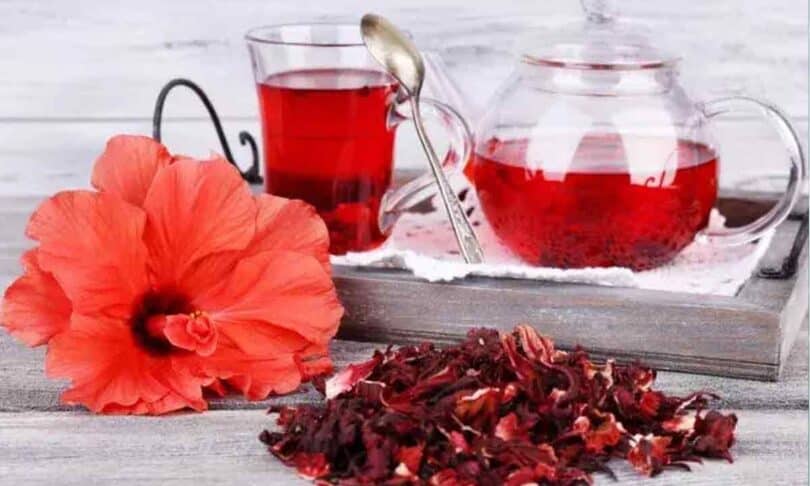Hibiscus tea benefits are numerous and are gaining the attention of many health enthusiasts. The tea is made by brewing the dried petals of hibiscus flowers. You can also make this tea by infusing hibiscus leaves in water.
However, tea made with petals is known to offer many benefits. It can heal wounds. Some also claim that this tea enhances hair health, promotes weight loss, and helps manage diabetes.
Health Benefits Of Hibiscus Tea
It may Help Treat Skin Ailments
Hibiscus tea may promote wound healing and treat other forms of skin ailments.
In rat studies, hibiscus extracts were found to have a better wound-healing property than a popular topical ointment. The hibiscus flower extract could effectively be used for treating topical wounds.
May Aid in Weight Loss
Treatment with the extract could improve obesity induced by a high-fat diet. The hibiscus extracts were rich in polyphenols and flavonoids, which helped reduce obesity parameters.
The water extract of hibiscus reduces the levels of serum triglycerides and total cholesterol. It does so by inhibiting lipid absorption in the gut.
May Help Manage Diabetes
A particular species of hibiscus may help treat diabetes and improve insulin sensitivity.
The petals of Hibiscus sabdariffa (another species of hibiscus) have phytochemicals like cyanidin 3, rutinocod, delphinidin, galactose, hibcitin, ascorbic acid, citric acid, anthocyanins, beta-carotene, and sitosterol.
May Lower Cholesterol Levels
There is increasing evidence that drinking hibiscus tea may have cholesterol-lowering effects.
Hibiscus, in general, contains polyphenolic acids, flavonoids, and anthocyanins. These compounds show antioxidant activity. The tea may have positive effects on cholesterol levels.
RELATED: Powerful Herbs For Weight Loss And Their Benefits
How To Make Hibiscus Tea
Hot Brew Hibiscus Tea
What You Need
- Dried hibiscus flowers: 2 teaspoons
- Water: 3-4 cups
- Boiling pot
- Cinnamon stick (optional)
- Mint leaves (optional)
- Lime wedge (optional)
- Honey, sugar, or sweetener of choice (to taste)
Let’s Make It!
- Set a pot of water to boil.
- Add the dried hibiscus flowers to an empty, clean teapot.
- Pour the boiling water into the teapot.
- Let the tea steep for about 5 minutes. The tea will start to become intense and red. You may steep it longer for a deeper/stronger taste.
- Strain the contents to get rid of the flowers.
- Add a sweetener of your choice. Drinking it unsweetened is even better.
- Serve it hot with a garnish of cinnamon, mint leaves, and a lemon wedge.
Iced Hibiscus Tea
You will need the same ingredients for making this version of hibiscus tea except for a pitcher. All you need to do is:
- Add the hibiscus flowers/powder and water to a pitcher. Stir well.
- Refrigerate the mix overnight (or for 8-12 hours) to steep the flavors well.
- You can cover the pitcher with its lid or foil.
- Take it out of the fridge once the flavor and color have developed.
- Strain the contents into serving glasses.
- You may add the sweetener in this step.
- Serve chilled with ice with a garnish of cinnamon, lime, and mint leaves.
- Having a cup of hibiscus tea two times a day could be ideal. There is no information available on the recommended dosage.
If you want to use dried hibiscus powder, about 250 mg a day should do.
You can also try the alcohol-free tincture of hibiscus flowers.
All these forms of hibiscus are equally effective. But hibiscus tea is the best of all.
Side Effects And Risks Of Hibiscus Tea
There are a few documented side effects of having hibiscus tea, including herb-drug interactions.
- Hibiscus roots exert an antifertility and uterotrophic effect. They may have estrogenic activity on your body and prevent fetal implantation or conception.
- The polyphenols in hibiscus tea might increase the body’s burden of aluminum. High urinary excretion of aluminum was observed days after consuming hot hibiscus tea. Hence, pregnant women and people with kidney stones should be cautious about an overdose.
- Hibiscus sabdariffa L. decoctions have shown herb-drug interaction with the diuretic medication, hydrochlorothiazide (HCT). They also interfere with the activity cytochrome P450 (CYP) complex. These CYP complexes are responsible for the metabolism of several prescribed drugs. Whether they have fatal effects or not needs to be studied further.
- Some evidence suggests that hibiscus tea may also lower blood pressure. Though there is no direct evidence that the tea may interfere with medications for treating high blood pressure, those on the same would need to check with their doctor before consuming hibiscus tea.
Hibiscus tea is an herbal beverage with a tart flavor and many medicinal properties. The rich nutritional and phytochemical compounds in hibiscus tea benefit your health in many ways.

